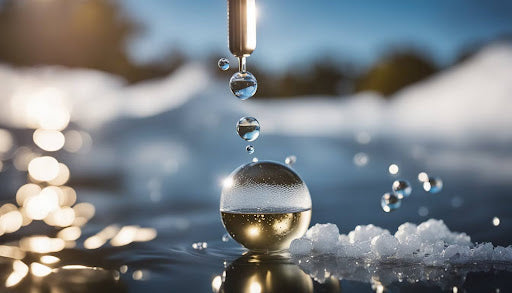888-963-9454
Mon-Sun: 9am-5pm CST
888-963-9454
Mon-Sun: 9am-5pm CST

The search for natural testosterone boosters is a hot topic in men's health, but what about the potential of cold therapies? It may seem counterintuitive, but the practice of taking a cold plunge has been linked to an array of health benefits, including the possibility of increased testosterone levels. Does stepping into icy waters really have the power to influence this vital hormone?
Stay with us as we dive into the chilly details to understand the science behind this bold claim. We’ll sift through research and expert opinions to provide a clear, no-nonsense picture of cold plunge and its impact on testosterone. Keep reading to uncover the cold, hard facts and see if this practice can truly enhance your hormonal health.
If you are searching for ways to boost your testosterone levels, you might have heard about cold plunge therapy. This technique involves immersing your body in cold water for a short period of time, typically between 1 to 5 minutes. Many people believe that cold plunge therapy can help improve testosterone levels, among other benefits.
Cold plunge therapy is a form of cold exposure that has been used for centuries in different cultures around the world. It involves immersing your body in cold water, usually around 50°F (10°C), for a short period of time. Some people choose to do this by taking a cold shower or bath, while others prefer to use a cold plunge pool.
Cold plunge therapy is believed to have several benefits, including reducing inflammation, improving circulation, and boosting the immune system. It is also thought to help with stress management and mental clarity.
Cold exposure has been used for centuries in different cultures around the world. In ancient Greece, athletes would bathe in cold water to help improve their performance and speed up recovery. Similarly, Nordic cultures have a long history of cold exposure, with many people taking cold dips in icy lakes and rivers as part of their daily routine.
In more recent years, cold exposure has gained popularity in the health and wellness community. Many people believe that it can help with weight loss, improve athletic performance, and even increase testosterone levels. While some of these claims are still being studied, there is evidence to suggest that cold exposure can have a positive impact on the body and mind.

Testosterone is a hormone that plays a vital role in the development and maintenance of male sex characteristics. It is produced in the testes of men and in smaller amounts in women's ovaries. Testosterone is responsible for regulating a range of bodily functions, including:
Testosterone levels can be influenced by a variety of factors, including age, diet, exercise, and stress. As men age, their testosterone levels tend to decline gradually. This decline can lead to a range of symptoms, including decreased sex drive, fatigue, and loss of muscle mass.
Diet can also play a role in testosterone levels. Research suggests that diets high in protein and low in fat can help boost testosterone levels. Exercise, particularly resistance training, can also help increase testosterone levels.
Stress can have a negative impact on testosterone levels. When you experience stress, your body produces cortisol, which can interfere with testosterone production. Finding ways to manage stress, such as through meditation or exercise, can help maintain healthy testosterone levels.
Research studies have shown that cold water immersion, also known as cold plunge, can have a significant impact on the body's hormonal response. A study published in the Journal of Strength and Conditioning Research found that cold water immersion increased levels of norepinephrine, a hormone that plays a role in the body's fight or flight response.
Another study published in the European Journal of Applied Physiology found that cold water immersion increased levels of growth hormone, which is important for muscle growth and repair. However, the study did not find any significant increase in testosterone levels.
Preliminary findings offer some intriguing insights. One study highlighted in the Journal of Endocrinological Investigation observed an increase in testosterone levels among male participants after they took a cold plunge, providing a spark of evidence supporting the practice for those looking to enhance testosterone naturally.
While this particular study didn't find the same effect in female participants, it opened the door to further exploration into how gender differences may play a role in the body's hormonal response to cold exposure.
Conversely, another piece of research from the Journal of Sports Medicine and Physical Fitness reported that no significant increase in testosterone levels was detected following cold water immersion. However, it's important to recognize that individual responses to cold therapy can vary widely, and what might not show a stark increase in one study could yield different results under varying conditions or in different populations.
These studies highlight the potential benefits of cold therapy and underscore the need for more research to paint a clearer picture of its effects. As we await more comprehensive research, the intrigue surrounding cold plunges and their role in hormonal health continues to grow, encouraging further investigation and personal experimentation.

Cold plunges have been suggested to have a number of potential health benefits, including an increase in testosterone levels. Other potential benefits include:
While these potential benefits are promising, more research is needed to fully understand the effects of cold plunges on the body.
Read Related Articles:
Before you start practicing cold plunge, it is important to take some precautions to ensure your safety. Here are some guidelines to follow:
Here are a few things you can do to optimize your cold plunge sessions and possibly increase your testosterone levels:
As we explore more studies in cold water immersion, the promising though not yet definitive links to increased testosterone levels continue to pique interest. The research we've explored offers a glimpse into the potential that cold plunges hold for those looking to give their hormonal health a natural boost.
Whether you're seeking to revitalize your body or simply curious about the holistic benefits of cold therapy, there's enough evidence to warrant giving it a try. As more studies surface, we anticipate a clearer understanding of how cold plunges can truly impact our physiology.
If you're inspired to integrate this invigorating practice into your daily routine, a personal cold plunge system could be a worthy investment. Browse the Carbon Wellness MD collections to discover a variety of cold plunge systems that cater to different preferences and lifestyles. Take control of your wellness journey with a refreshing plunge that could do more than just cool you down—it might just fire up your testosterone levels too.
There is some evidence to suggest that cold water immersion, such as a cold plunge, may increase testosterone levels in men. However, more research is needed to confirm this effect and to determine the optimal duration and frequency of cold plunges for testosterone production.
Cold water immersion can affect hormone levels, including testosterone, cortisol, and growth hormone. Research suggests that cold water immersion may increase testosterone and growth hormone levels, while decreasing cortisol levels.
Some studies have found that cold water immersion, such as a cold plunge, may increase growth hormone levels. However, the evidence is mixed, and more research is needed to confirm this effect.
Several lifestyle factors may boost testosterone levels, including exercise, a healthy diet, adequate sleep, and stress management. Certain supplements, such as vitamin D and zinc, may also help to increase testosterone levels in some men.
Cold water immersion, such as a cold plunge, may have several potential health benefits, including reducing inflammation, improving circulation, and boosting mood.
The information in the Website is provided “as is” and for general information only. It is not intended as medical advice and should not be relied upon as a substitute for professional consultation with a qualified healthcare provider familiar with your individual medical needs.